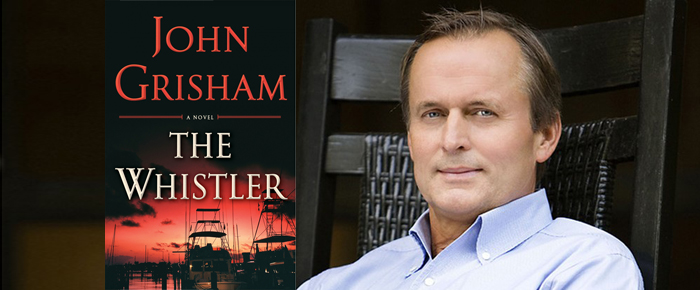
By Heidi Simmons
—–
The Whistler
by John Grisham
Fiction
—–
The Coachella Valley may have the country’s best “Indian” casinos. Our local tribes have been leaders in Native American gaming rights for decades. Tribal members, as well as the community, have benefited by their success. In John Grisham’s latest novel, The Whistler (Doubleday, 374 pages) corruption closes a Florida casino.
The story’s protagonist is Lacy Stoltz. She is a lawyer who works as an investigator for the Florida Board on Judicial Conduct. It is her job to makes sure that state judges are behaving fairly and ethically. Most of her work involves judges who have crossed a line unintentionally rather than deliberately. She doesn’t carry a badge and she has no authority to arrest anyone.
When Lacy gets a call from Greg Myers, a mysterious man and a former lawyer, about a judge who is being paid off by a local tribe, the charges are bigger and more complicated than any case she has had.
Myers produces evidence that judge Claudia McDover is collecting cash money from the “Coast Mafia” who is skimming from the tribe every week for judgments ruled in their favor on legal matters. The judge tries to live humbly, but she and her lover travel and spend extravagantly and own property all over the world – suspiciously, nothing is in her name.
Meanwhile, an innocent man sits on death row waiting for his execution date. Evidence shows he was framed for the murder of his wife and another man. As a tribal member, he believes the tribe and Coast Mafia wanted him out of the way because of his opposition to the building of the tribe’s casino. Judge McDover condemned him to death and then denied all his appeals.
With Native American sovereignty, there is little local law enforcement can do. Only the FBI has the power to investigate and make arrests on Indian land. But, the FBI is too busy hunting down terrorists and hasn’t the manpower to search out the corruption.
As Lacy and her partner file the complaint, they are on their own. They quickly discover more evidence and ties between the judge and the mafia. When the BJC agents are in a deadly accident on the reservation, and, after their source, Myers, goes missing, the FBI finally takes action.
The investigation takes dangerous and unexpected turns. Lacy is almost powerless to do anything. With Myers gone, the real insider –“The Whistler” — is exposed. Now she is on the run for her life, and if something happens to her, the case may be over.
Lucy is an unexpected character in that she is mostly uncomplicated and not emotionally damaged. In her late forty’s, she is pretty, single and has no kids. She’s dedicated to her job and justice. I found her simplicity refreshing. She recognizes she is in over her head and is willing to get outside help when she needs it. But she is also tenacious, tough and resilient.
Author Grisham delivers a complex legal world around tribal sovereignty. Living in the CV, we are familiar with our local tribes and reap the benefits of their generosity and success.
But Grisham shows just how much money flows through Native American casinos and how easy it is to launder money — especially at the black jack tables. The numbers are staggering.
More significantly, the narrative includes the cultural impact of Native Americans having so much money. The tribe in the book restricts membership and dictates revenue dividend policy to its members based on gender.
For me, I wanted to know more about “The Whistler” earlier on. When the snitch, Myers, first reveals that he wants to reap the rewards for blowing the whistle, the reader never gets a clear understanding of how that works. Hardly seems worth any amount when you are blowing the whistle on such dangerous and deadly characters.
It is not until the end that Grisham sets forth the Florida Whistler law. Even then, it’s pretty slim. As the authorities lock up the bad guys, killers and corrupt conspirators, “The Whistler Fund” grows to $83 million as they recover assets and money. Not until the epilogue do we see why they are so willing to risk their lives!
Although I wish this story included more of the POV from the “Whistlers,” Grisham does a great job writing about the colorful world of Florida, the people who live there and the complications with Native American sovereignty.
The plot is engaging, the law fascinating, and because the CV has tribal gaming, it made the read even more compelling. The Whistler also felt timely as the former Mayor of Palm Springs faces corruption charges along with a local developer. This story may be set in Florida, but it felt very close to home.










































